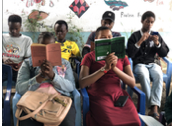The original source of this proverb is Ovid's "Art of Love", a book of advice for men and women about finding and keeping romantic relationships, written over 2000 years ago, about 2 AD:
People don't resist the temptation of new delights. We always deem that other people are more fortunate than ourselves. The crop is always better in our neighbour's field; his cows more rich in milk.
- Ovid The Art of Love, Page 24
One lesson from this proverb is to focus more on what you have, ignoring what others may have that is better. Another lesson might be to put your attention on improving your own situation (like watering your lawn) rather than dwelling on the fact that your lawn (or situation in general) is inferior.
An interesting variation on this proverb is: "The grass is always greener where you water."
Similar proverbs from other cultures:
दूर के ढोल सुहावने लगते हैं
From far away the drums sound better
隔籬飯香
Next door's rice smells good
隣の芝生は青く見える
The neighbor's grass seems green
соседняя очередь всегда движется быстрее
The other queue always moves faster

























